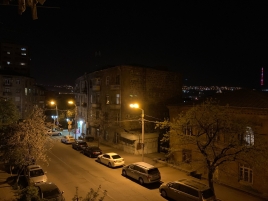State of Emergency Relaxed in Armenia, but Extended as COVID-19 Cases Decline
Thursday, April 16, 2020
With the continued drop in new infections entering its second consecutive week, the Armenian National Assembly passed a motion extending the current State of Emergency (SOE) by another month. The SOE, which was initially declared on March 16th to facilitate the coordination of efforts to contain the COVID-19 pandemic, was initially scheduled to expire on Thursday, April 16.
The more draconian lockdown measures, however, were announced by Prime Minister Nikol Pashinyan a week later on March 24 as the contagion rate had seemingly increased. Under the lockdown measures all businesses deemed “non-essential” were ordered to close, and citizens were urged to remain indoors whenever possible and only leave for exercise, grocery shopping or other emergencies.
However, at the urging of Health Minister Arsen Torosyan, who has warned citizens not to raise hopes for a quick return to normal despite the promising data, the government voiced its support for maintaining current lockdown measures as a cautionary measure until the outbreak is better contained. While the State of Emergency has been extended by a month, several of the restrictions have been notably relaxed. A clause permitting government censorship over media coverage of the pandemic, which hitherto had been seldom enforced due to pushback from media freedom watchdogs, has been removed entirely. Additionally, private enterprise in the textile, construction, mining, food processing and agriculture industries are now allowed to reopen provided that appropriate health and safety measures are put in place, and are still subject to future shutdown if need be.
During a Monday morning cabinet meeting, the Prime Minister expressed his hope that a phased re-opening of other sectors of the economy would follow if this first step were to be successful. “However, we must be conscious of the fact that even when we reopen factories, cafes and restaurants, life won’t immediately go back to what it was before,” warned Pashinyan. “Expect to maintain strict hygiene and safety measures for the near future,” he continued.
This tentative relaunching of business activities may provide some amount of buttress against the expected economic downturn triggered by the global trade disruptions in the wake of the pandemic. The International Monetary Fund (IMF) has produced sobering economic output estimates for the region, revising Armenia’s predicted 7.5 percent GDP growth for 2020 to 1.5 percent growth—still higher than Armenia’s own 0.7 percent estimate. However, IMF data concurs with that of the Armenian Central Bank, as well as the World Bank, in projecting a strong economic rebound for 2021.
The Labor and Social Affairs Ministry has continued to produce social and economic assistance packages for those affected. At the moment, the medley of available emergency government aid includes deferments on tax and utility payments, subsidies on utilities, rents, salaries and zero-interest loans for small business owners, unemployment insurance for laid off workers and cash allowances for expectant mothers and per child for informal workers employed in Armenia’s large “grey economy.” Virtually all of these assistance packages are accessible online, requiring only an ID card and a valid bank account, while others are automated.
The government has acknowledged that some of these measures may be imperfect or inadequate to cover all those affected. However, they are continuously tweaking their response based on feedback from open dialogue with economists, civil society groups, reports from social workers and the public at large.
Authorities have also been working closely with minority groups to provide valuable information about the COVID-19 pandemic and appropriate response in the Yezidi, Greek and Assyrian languages as well. Much of this information is already available to Armenian citizens via a new app released last week.
“I would like to thank all of the organizations and associations in the Armenian Diaspora which have stood firmly with the homeland with much needed support during this crisis,” said Zareh Sinanyan, Armenian High Commissioner for Diaspora Affairs in a video posted on the Armenian government’s official Facebook page. “In these difficult times, I urge you to also closely follow the health and safety guidelines issued by the governments of your home countries as well for your own safety.”
https://armenianweekly.com/2020/04/15/state-of-emergency-relaxed-in-armenia-but-extended-as-covid-19-cases-decline/





